Unit 34: Early Learning Intervention Strategies for Children with Autism
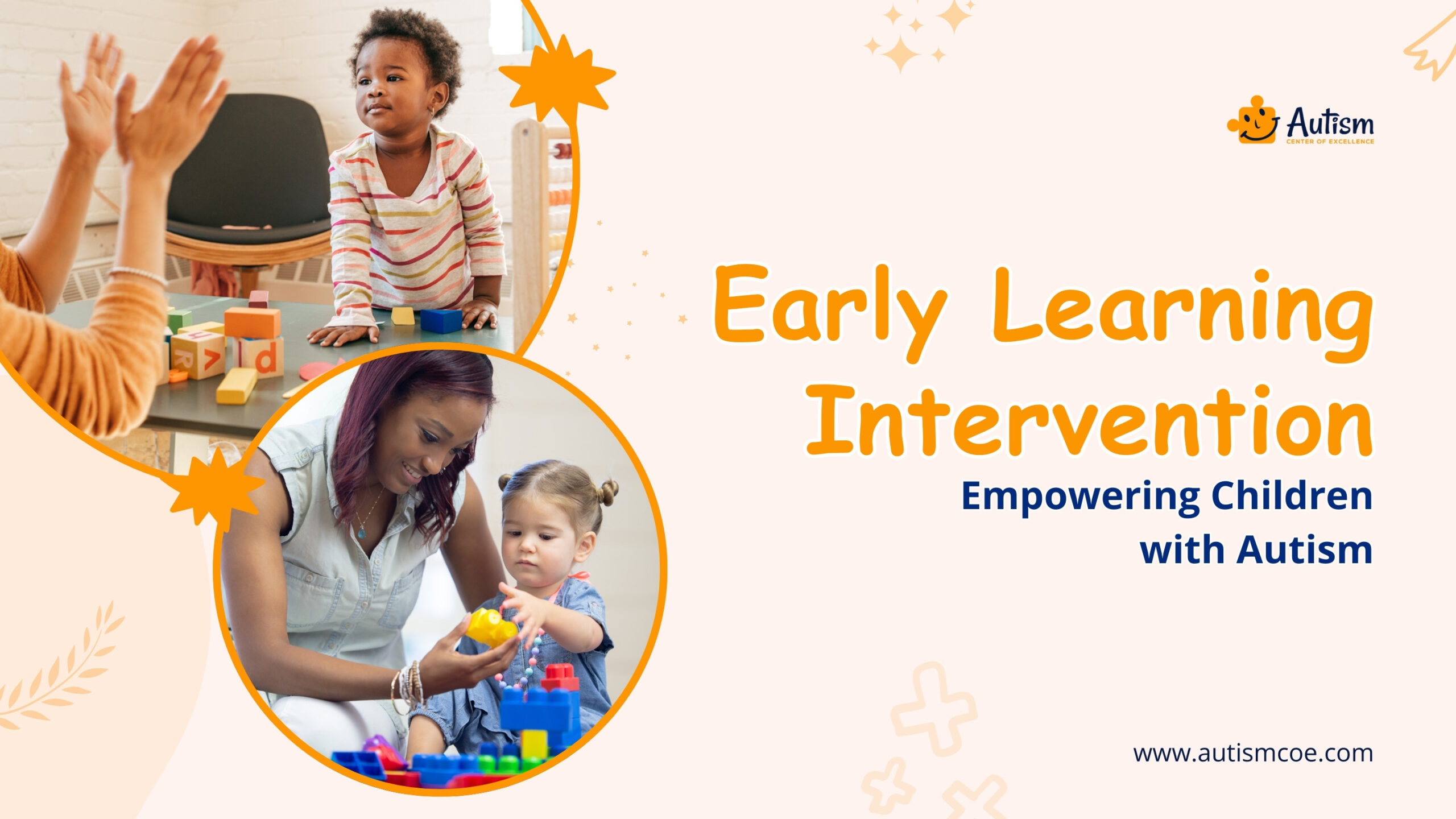
It is important to note that while it’s fulfilling to care for children with autism, they are a big challenge, especially in Development Milestones. Early Learning Intervention is a potent weapon, providing methods for developing key skills, enhancing interaction, and teaching self-governing during childhood. Together with the professional programs of the Early Step Learning Center, Early Intervention enables families and children to succeed. That is why tackling delay is crucial and makes it possible to change the life of a child with autism for the better.
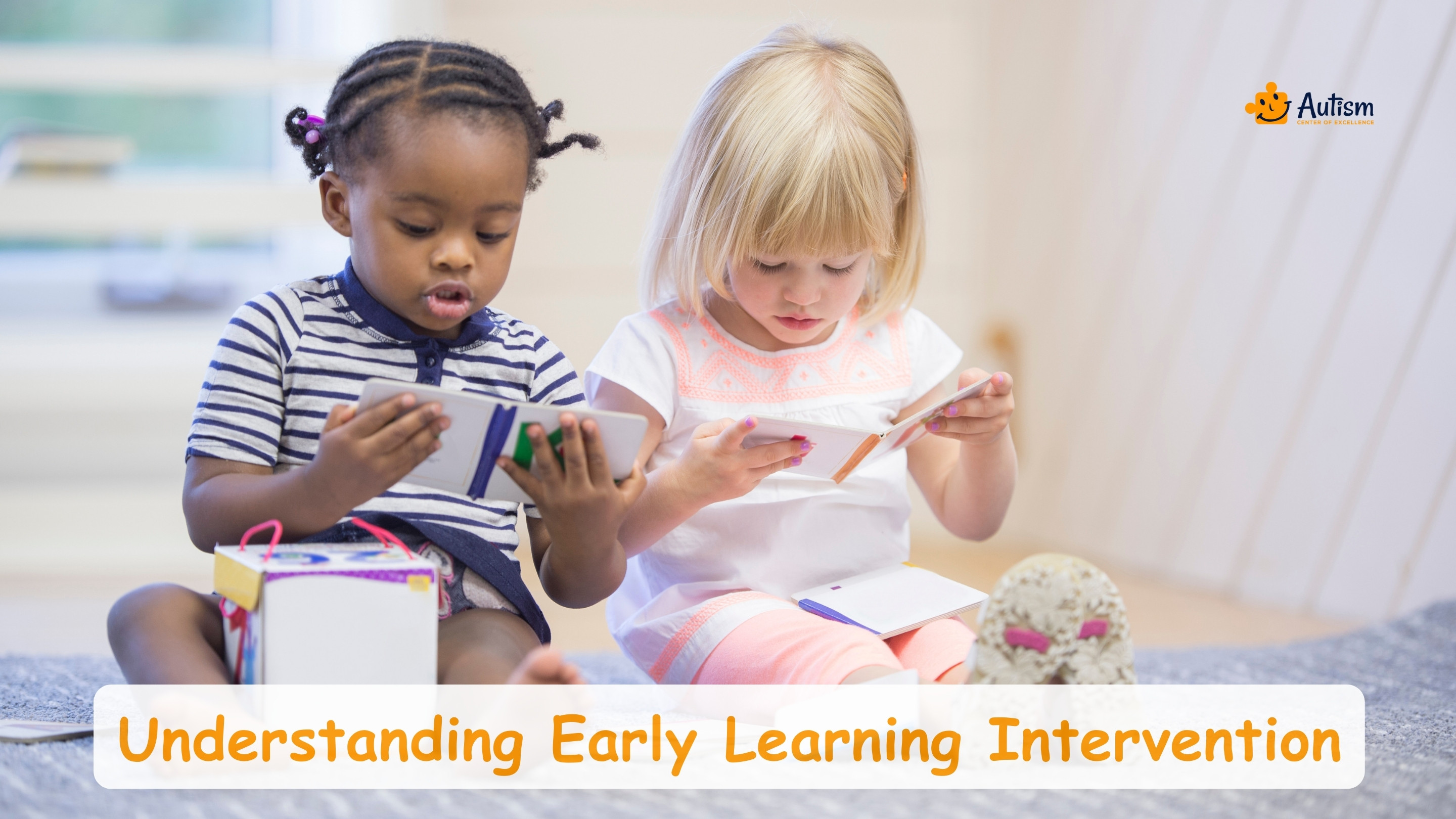
What is Early Learning Intervention?
Early Learning Intervention is an evidence-informed model that helps children at risk of or experiencing developmental difficulties. To children with autism, it provides solutions to some of their basic needs such as communication, behavior, and social interaction which may be at different levels than other children.
Early learning intervention involves aspects like making simple sentences, responding to social stimuli, and improving Fine Motor Skills. Thus, these programs help to reveal the delays and provide specialized methods for overcoming them to help kids succeed.
For instance, if a child has difficulties with using words, speech therapy can show them how to use pictures, for example, to tell others what they want or how they feel. If there is a delay it is more effective to address, it earlier in the child’s development to get the most favorable results and the child will stay on the right developmental track.
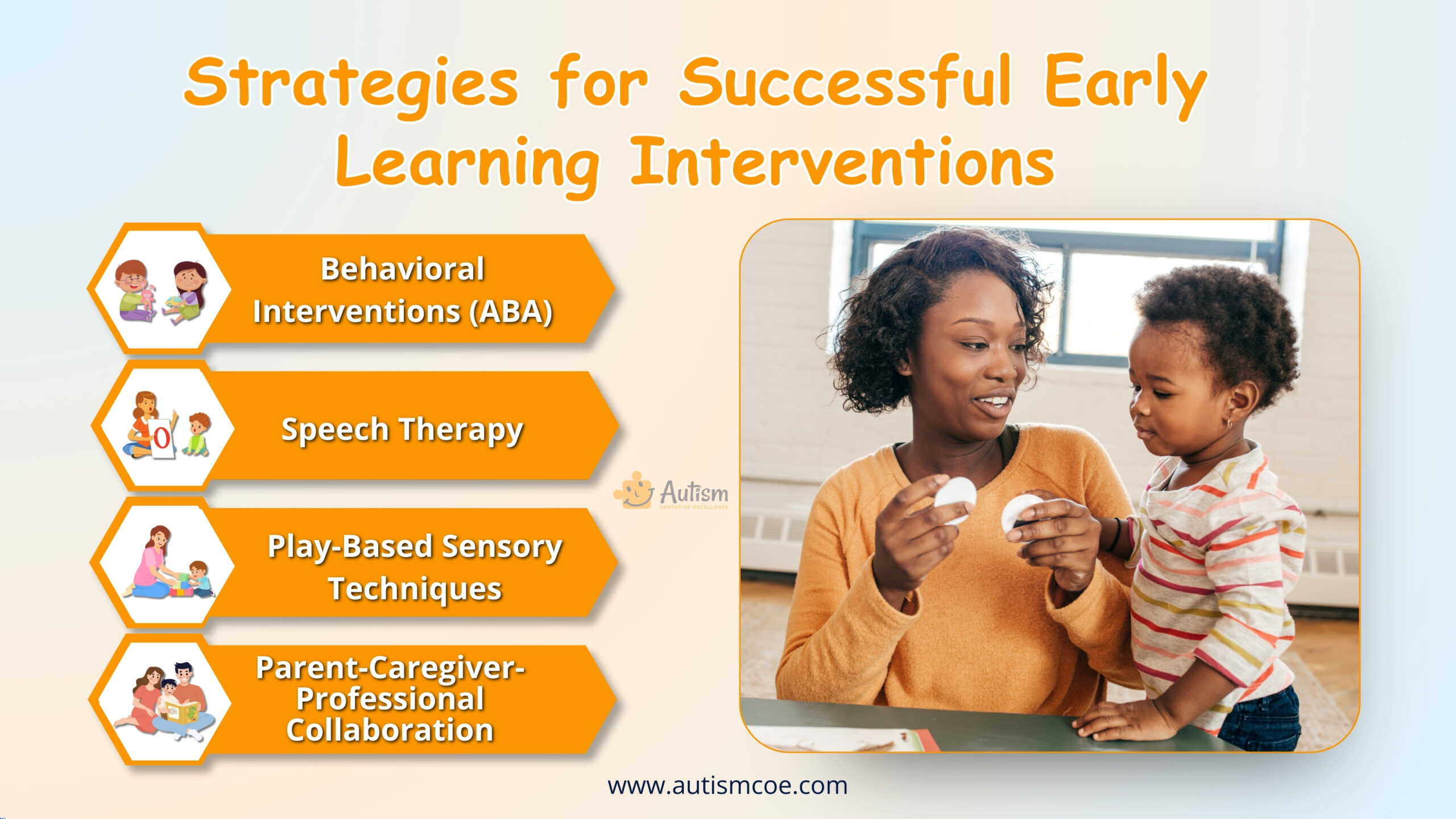
Key Strategies for Effective Early Learning Interventions
Learn key approaches that can help improve early learning intervention and what is best for children’s growth and future.
1️⃣Behavioral Interventions (e.g., Applied Behavior Analysis – ABA):
Positive Reinforcement is a concept used by Applied Behavior Analysis (ABA) to encourage specific behaviors that are beneficial and discourage those that are negative. This approach to teaching and learning is backed with evidence and may involve play and rewards to ensure children are interested. ABA is centered on the needs of the s of the person, and this makes the environment easy to understand and fosters change. Its systematic but fun method is to teach children in a safe environment the skills they need to learn.
2️⃣Speech Therapy:
The majority of children with autism experience problems in communication, speaking, and understanding language. Speech Therapy assists them in enhancing their speaking, as well as their use of hands and face. Therapists employ techniques such as telling stories, singing, or using objects to explain and convey ideas and feelings to children to improve their ability to express themselves in their environment.
3️⃣Play-Based and Sensory Integration Techniques:
Play is much more than a source of amusement; it is an essential learning strategy. Play helps the child to build creativity, problem-solving, and social aspects of the child. Sensory Integration is a way of helping kids to process sound, touch, light, and other feelings that can be too much for some children especially those on the autism spectrum. The former approaches enhance places to promote growth and development while the latter enhances places to help in learning.
4️⃣Collaboration Between Parents, Caregivers, and Professionals:
Control is a very important factor in the growth of a child and that is why in this work the concept of consistency will be discussed. It means that all of them will support the strategies used during the therapy at home and at school. This method is harmonious and thus the child has all the tools they need to Develop Their Skills in a single space. All of the caregivers can help the child move forward and be healthy when everyone collaborates.
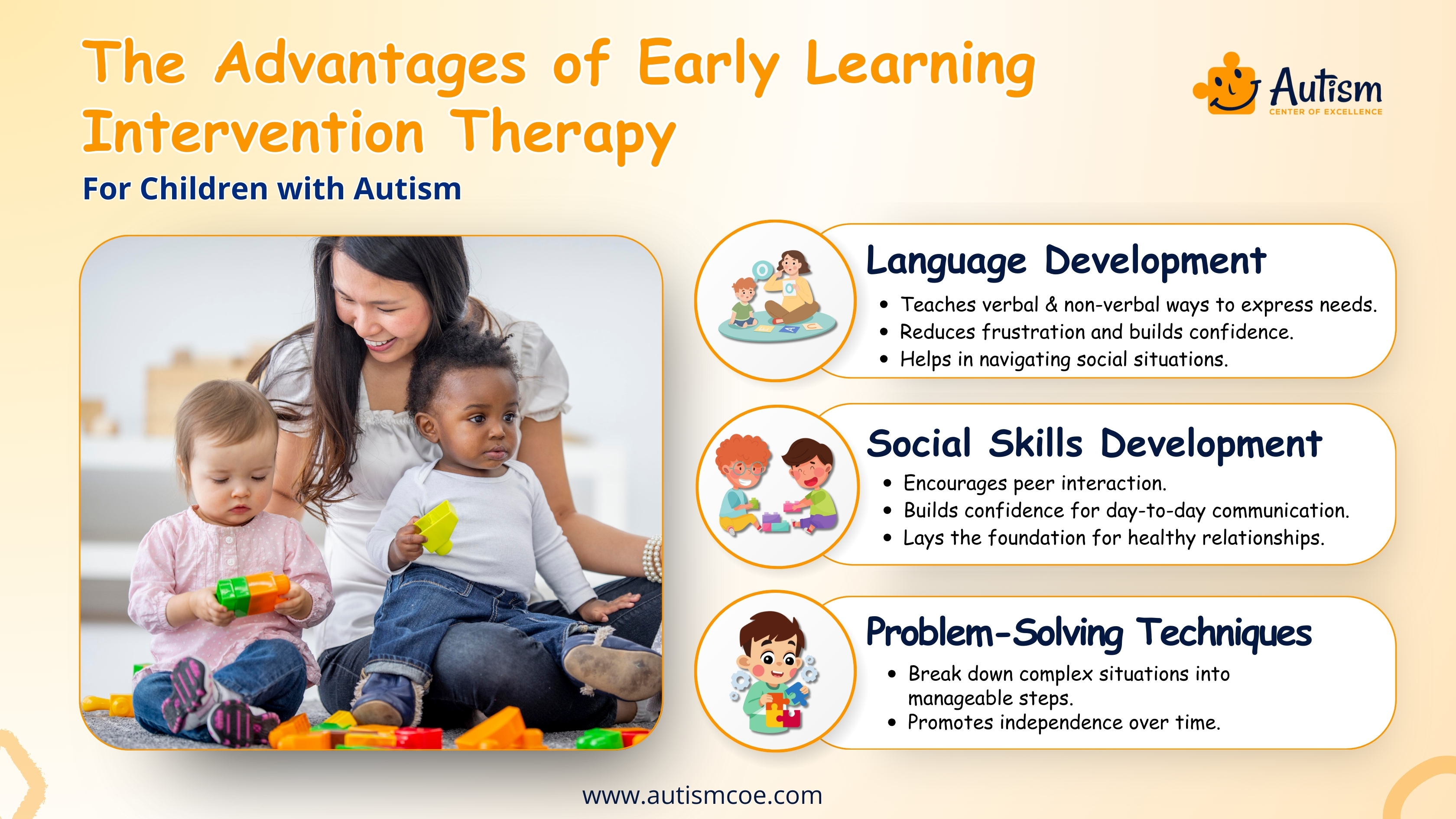
Benefits of Early Learning Intervention Therapy
Early Learning Intervention Therapy brings many positive changes that impact development at every level of a Child’s Development.
1️⃣Language Development:
Language is one of the biggest barriers that children with autism experience since many of them are unable to convey their ideas, desires, or emotions. This may result in frustration, miscommunication, and a lack of ability to build relationships with other people. Therapies like speech therapy or ABA therapy provide information on how to communicate wants and feelings in words or gestures. These therapies not only help in reducing the level of frustration but also help to build the confidence of children in dealing with social situations and forming good relationships with the people around them.
2️⃣Social Skills Development:
Prevention fosters growing prosocial behaviors which prepare people for interaction with their peers and identification of social signals. These are important skills for use in day-to-day interactions with others, for boosting self-esteem, for better communication, and for the development of good interpersonal relationships in the workplace, as well as in other spheres of life.
3️⃣Problem-Solving Techniques:
Children are taught in a systematic way to analyze a problem and solve it and this in a way enhances the children’s independence.
It is common to find that professional centers like the Early Step Learning Center employ research-based methods that guarantee results. Thus, through these strategies, children are provided with the necessary skills that will enable them to perform better in both academics and their daily lives.
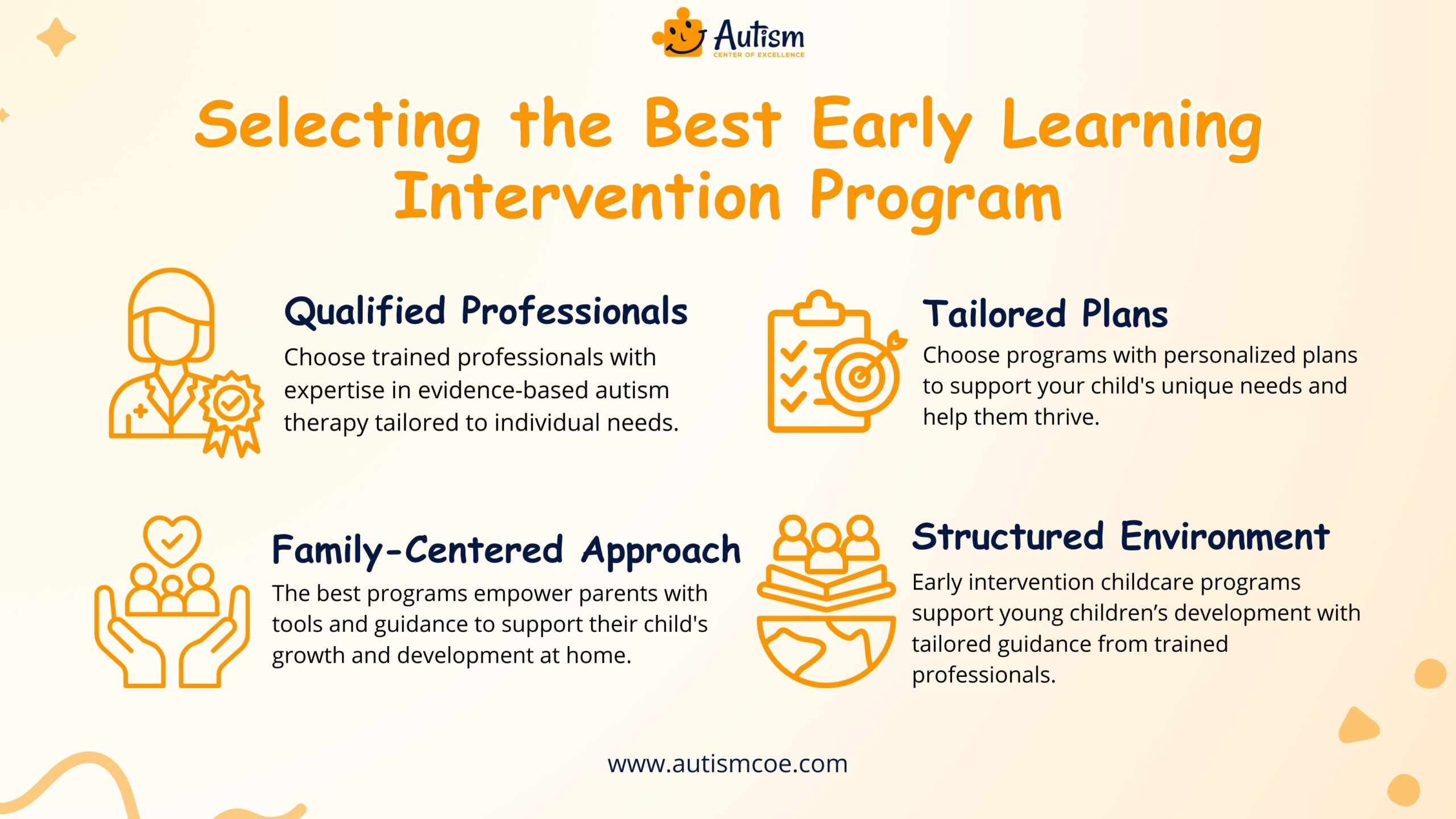
Choosing the Right Early Learning Intervention Program
Choosing the right program can be quite overwhelming but knowing what you are looking for makes the whole process easier. Here are some key factors to consider:
Qualified Professionals
Find out the most experienced and well-trained practitioners who are into Autism Therapy and education. These professionals should therefore have an understanding of evidence-based practices and the ability to adapt their practice to individuals with autism.
Tailored Plans
All children are different and have different abilities, difficulties, and learning styles. It is vital to find programs that have specific plans written for your child, to meet his or her Special Needs. These customized approaches help your child get the help and tools they need to succeed and grow in any area of their life including academically, socially, or emotionally.
Family-Centered Approach
Some of the most effective programs therefore engage parents and caregivers given your crucial part to play in your child’s development. These programs offer tools, tips, and advice to help you foster your child’s learning, communication, and emotional health when at home, thus laying a helpful foundation for future learning.
Structured Environment
EI (Early Intervention Childcare Programs) is an organized and stimulating setting for young children’s development. These programs teach values, social skills, and problem-solving and provide a firm base for learning. Trained professionals, therefore, assist children in overcoming barriers and attaining their full potential.
Enjoying Reading?
Join Our Weekly Newsletters!
Subscribe now to stay updated with our latest email updates.
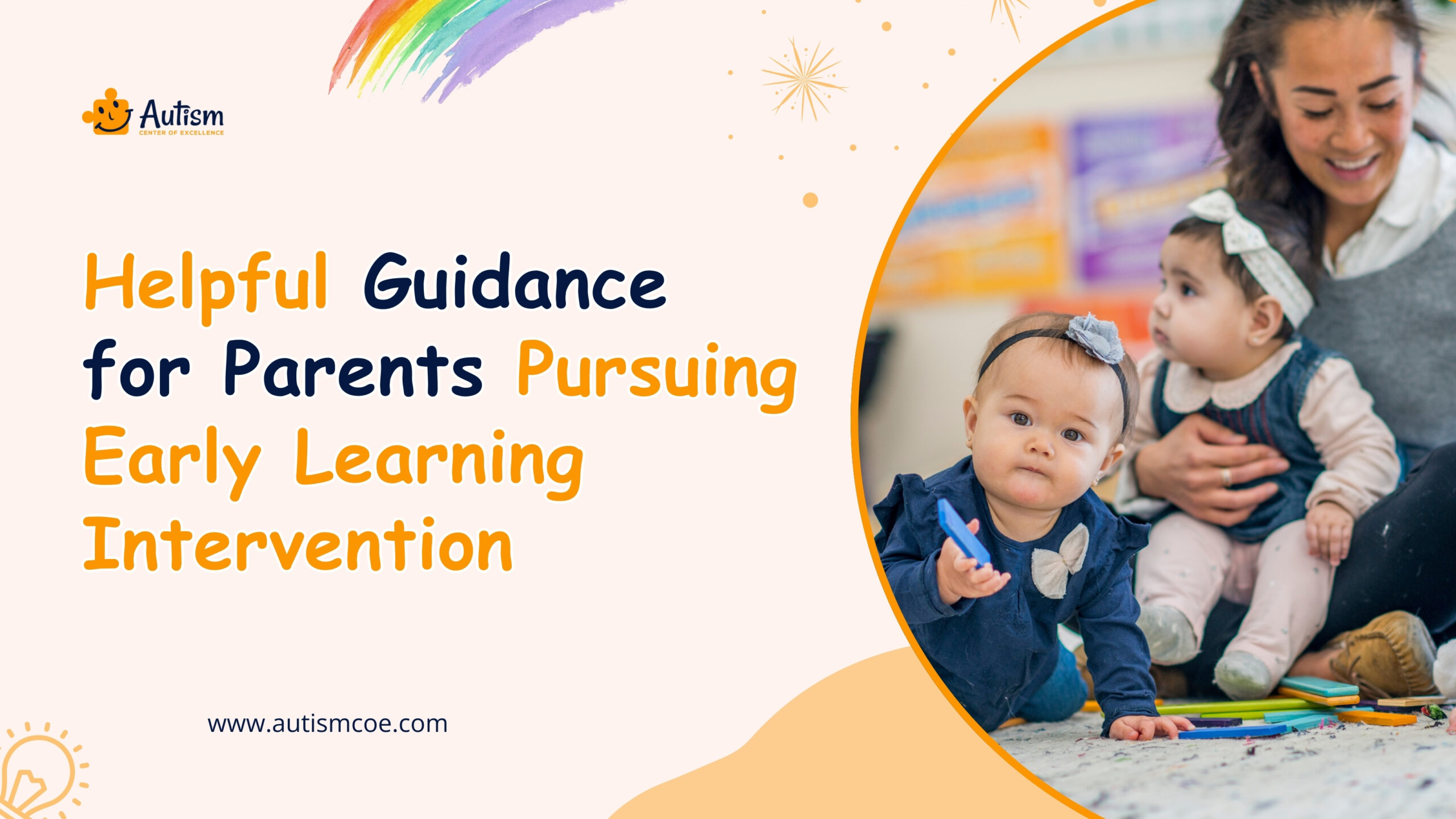
Tips for Parents Seeking Early Learning Intervention
Learn the most important information for parents of children in early learning intervention. Discover how to foster your child’s development, know his or her needs, and find useful information.
- Trust Your Instincts: In this situation, if you think that your child may have a delay, it is recommended to contact a pediatrician or child development specialist.
- Research Local Resources: Some of the centers like Early Step Learning Center may provide a consultation or a trial.
- Communicate Your Child’s Needs: It is important to disclose as much information as possible to professionals to design the best possible intervention.
Frequently Asked Questions & Answer
What is the Main Goal of Early Learning Intervention?
Early learning intervention aims to help children overcome developmental issues as early as possible, promoting their development, achieving developmental milestones, and laying the platform for later learning and development.
Why is Early Learning Intervention Important for Children with Autism?
The reason for this is that Early Learning Intervention is effective in the context of the developing brain in infancy. It has been seen that early intervention increases the possibility of the child overcoming the problem and achieving developmental goals such as language, social interaction, and thinking skills.
What Types of Therapies are Included in Early Learning Intervention Programs?
Some of the most typical interventions are ABA for behavior, speech therapy to facilitate communication, occupational therapy for motricity and sensory integration, and play therapy for social and cognitive development. All the programs are made according to the child’s requirements.
At What Age Should Early Learning Intervention Begin?
The earlier is always preferable, and children as young as 18 months should be assessed if they demonstrate developmental problems. This is because early identification and early entry into the system will enhance the child’s development and milestones in communication, behavior, and academics.
Conclusion
Childhood development is crucial in the first years of a child’s life since the child is learning and building the stones of his/her life, and this is the same for Children with Autism. This is the most Developmental Age since the children’s brains are still very flexible to learn and develop.
This means that those children with developmental delays should be given early learning intervention to ensure that they have the best start in life, with focused areas being communication, social interaction, and problem-solving. These interventions assist them in overcoming life’s barriers and reaching their maximum potential thus paving the way to a brighter and independent future.
Thus, the earlier parents, caregivers, and educators begin and select the right program, their impact can be lifelong. Hear this, take the step today to seek local programs, childcare, or early learning centers, every step counts toward a brighter future for your child.
Please Note: The content of this blog is for informational purposes only and should not be considered a substitute for professional medical advice, diagnosis, or treatment. Consult a qualified healthcare professional for personalized guidance tailored to your specific situation.

Bhavika Bhasin
Bhavika Bhasin is the Research and Marketing officer at AutismCOE. She works with children and adults with ASD. Her clinical research includes evaluating various available autism screening and diagnosis methods and their efficacy. She is currently developing a novel screening exam that is indicated to be more accurate than the existing available exams. She is also writes articles papers for various publications.

